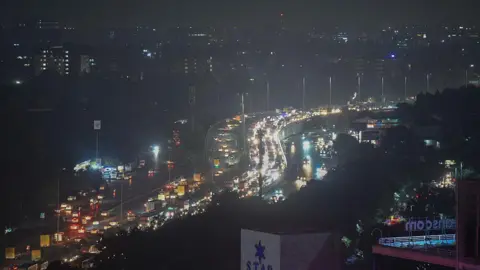Language represents a crucial aspect of cultural pride in India, particularly in states formed around linguistic identities after independence. As demonstrations gathered momentum, prompting the Maharashtra government, a coalition led by the Bharatiya Janata Party (BJP), to revoke the policy and establish a committee for reassessment, the backlash intensified. Tensions over Hindi have historically provoked anxiety among non-Hindi-speaking states, particularly as the BJP government has been accused of prioritizing Hindi, leading to fears of cultural erosion amid rising migration from Hindi-speaking regions.
Amidst the furor, incidents of violence erupted against those speaking languages other than Marathi. Allegations of assaults surfaced, including attacks on individuals for not conversing in Marathi and disputes arising over the use of language in social interactions. A notable incident involved a security guard in Mumbai who suffered violence after admitting he did not speak Marathi, highlighting the rising hostility in the community.
Political dynamics shifted as rival political factions united against the perceived Hindi imposition, with Uddhav and Raj Thackeray, once estranged, joining forces to rally support for Marathi pride. Their partnership may shape electoral strategies ahead of the anticipated municipal elections in Mumbai, where cultural identity plays a pivotal role in determining voter sentiment.
Despite the anger surrounding language politics, critics argue that focusing on linguistic divisions could lead to increased violence and social fragmentation. The editorial stance in prominent publications, such as the Indian Express, reflects concern over the implications of such aggressive identity politics, advocating for a more holistic approach that prioritizes economic development over divisive rhetoric. Political analysts suggest the temporary gains of linguistic-driven movements might falter in the long term if leaders fail to address pressing socio-economic issues, echoing broader desires for stability and advancement among constituents in Maharashtra.
Amidst the furor, incidents of violence erupted against those speaking languages other than Marathi. Allegations of assaults surfaced, including attacks on individuals for not conversing in Marathi and disputes arising over the use of language in social interactions. A notable incident involved a security guard in Mumbai who suffered violence after admitting he did not speak Marathi, highlighting the rising hostility in the community.
Political dynamics shifted as rival political factions united against the perceived Hindi imposition, with Uddhav and Raj Thackeray, once estranged, joining forces to rally support for Marathi pride. Their partnership may shape electoral strategies ahead of the anticipated municipal elections in Mumbai, where cultural identity plays a pivotal role in determining voter sentiment.
Despite the anger surrounding language politics, critics argue that focusing on linguistic divisions could lead to increased violence and social fragmentation. The editorial stance in prominent publications, such as the Indian Express, reflects concern over the implications of such aggressive identity politics, advocating for a more holistic approach that prioritizes economic development over divisive rhetoric. Political analysts suggest the temporary gains of linguistic-driven movements might falter in the long term if leaders fail to address pressing socio-economic issues, echoing broader desires for stability and advancement among constituents in Maharashtra.






















